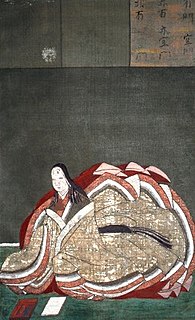A Quote by Murasaki Shikibu
One ought not to be unkind to a woman merely on account of her plainness, any more than one had a right to take liberties with her merely because she was handsome
Related Quotes
Take love as a sober man takes wine; do not become a drunkard. If your mistress is sincere and faithful, love her for that; but if she is not, if she is merely young and beautiful, love her for that; if she is agreeable and spirituelle, love her for that; if she is none of these things but merely loves you, love her for that. Love does not come to us every day.
A year ago Guyana became politically free and independent. She assumed the untrammeled right to make her own decisions on what ought to be done or ought not to be done within her border. Since then, hers has also been the right to decide what course she would take and to state her views and opinions positively in the fora of the world. As we celebrate the first anniversary of freedom, it is our duty to take account of what we have achieved or what we have failed to do, to note where we have done well and what we ought to have done better.
The extraordinary woman depends on the ordinary woman. It is only when we know what were the conditions of the average woman's life - the number of children, whether she had money of her own, if she had a room to herself, whether she had help bringing up her family, if she had servants, whether part of the housework was her task - it is only when we can measure the way of life and experience made possible to the ordinary woman that we can account for the success or failure of the extraordinary woman as a writer.
Her own body was such a familiar and unremarkable thing to her that she was puzzled by the convulsive ecstasy men could take from it, by the intense and amusing need they had merely to touch it, to reach out urgently and press it, squeeze it, pinch it, rub it. She did not understand Yossarian's lust; but she was willing to take is word for it.
There was a warmth of fury in his last phrases. He meant she loved him more than he her. Perhaps he could not love her. Perhaps she had not in herself that which he wanted. It was the deepest motive of her soul, this self-mistrust. It was so deep she dared neither realise nor acknowledge. Perhaps she was deficient. Like an infinitely subtle shame, it kept her always back. If it were so, she would do without him. She would never let herself want him. She would merely see.
[Keeping kosher was] the symbol of an initiation, like the insignia of a secret brotherhood, that set her apart and gave her freedom and dignity. Every law whose yoke she accepted willingly seemed to add to her freedom: she herself had chosen . . . To enter that brotherhood. Her Judaism was no longer a stigma, a meaningless accident of birth from which she could escape . . . It had become a distinction, the essence of her self-hood, what she was, what she wanted to be, not merely what she happened to be.
But when did you see her, talk to me? When did you see her go into the cave? Why did you threaten to strike a spirit? You still don't understand, do you? You acknowledged her, Broud, she has beaten you. You did everything you could to her, you even cursed her. She's dead, and still she won. She was a woman, and she had more courage than you, Broud, more determination, more self-control. She was more man than you are. Ayla should have been the son of my mate.
Nowhere is woman treated according to the merit of her work, but rather as a sex. It is therefore almost inevitable that she should pay for her right to exist, to keep a position in whatever line, with sex favors. Thus it is merely a question of degree whether she sells herself to one man, in or out of marriage, or to many men!... The economic and social inferiority of woman is responsible for prostitution.
Selfishly, perhaps, Catti-brie had determined that the assassin was her own business. He had unnerved her, had stripped away years of training and discipline and reduced her to the quivering semblance of a frightened child. But she was a young woman now, no more a girl. She had to personally respond to that emotional humiliation, or the scars from it would haunt her to her grave, forever paralyzing her along her path to discover her true potential in life.
Morally a woman has a right to the free and entire development of every faculty which God has given her to be improved and used to His honor. Socially she has a right to the protection of equal laws; the right to labor with her hands the thing that is good; to select the kind of labor which is in harmony with her condition and her powers; to exist, if need be, by her labor, or to profit others by it if she choose. These are her rights, not more nor less than the rights of the man.
The wide world was changing, and she wanted a different place in it. Not just wanted, but felt she deserved. If the world didn't owe her a living, as her mother repeatedly warned her, it owed her a break. She had a strong sense that a better, more exciting, more rewarding life than that which had been the lot of her parents and grandparents was hers by right. In this she was guilty of nothing more serious than the arrogance of youth, from which every generation suffers and by which it distinguishes itself from the preceding one.
She was trying to say something else; she was trying to say that the inability to articulate what one feels in any satisfactory way is one of our enduring tragedies. It wouldn't have been much, and it wouldn't have been useful, but it would have been something that reflected the gravity and the sadness inside her. Instead, she had snapped at him for being a loser. It was as if she were trying to find a handhold on the boulder of her feelings, and had merely ended up with grit under her nails.
A queen is wise. She has earned her serenity, not having had it bestowed on her but having passer her tests. She has suffered and grown more beautiful because of it. She has proved she can hold her kingdom together. She has become its vision. She cares deeply about something bigger than herself. She rules with authentic power.







































